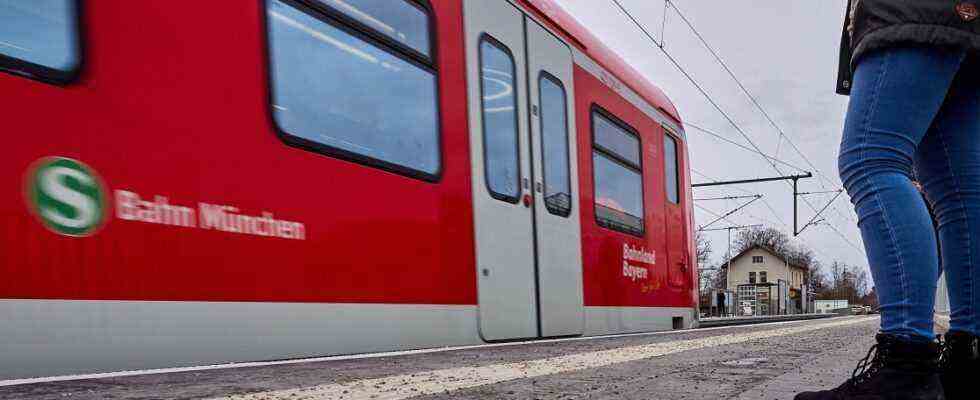The Munich S-Bahn recently ran more unpunctually than it had in at least ten years. The MVV complained about the unreliability of the S-Bahn at Deutsche Bahn. Martina Neubauer lives in Starnberg and heads the department for service economy, social commitment and inclusion, senior citizens’ affairs at the Munich district office. The 58-year-old is with the Greens and is politically involved in the district and on the Upper Bavarian level as a district councilor. How does Neubauer experience the transport connection between the district and the state capital?
SZ: Ms. Neubauer, you live in Starnberg and work in the district office in Munich. What role does the Munich S-Bahn play in your daily life?
Martina Neubauer: Before working from home, I used to take the S-Bahn or regional train almost every day. Now, in times of working from home, not quite as often. But in principle since I’ve been working at the Munich District Office – and that’s been a really long time – every day, five days a week, back and forth.
Martina Neubauer knows the S-Bahn connection between Starnberg and Munich well. The 58-year-old lives in Starnberg and commutes professionally to the state capital, where she works at the Munich district office.
(Photo: Arlet Ulfers)
The punctuality of the Munich S-Bahn has recently fallen to a worse value than it has been for at least ten years. Have you often had to cancel or reschedule appointments because of unpunctual S-Bahn trains?
In fact, this happens to me all the time. In times of mobile phones and when you can work on the go, that’s not so bad anymore. But sure, super annoying. Whenever there are infrastructural problems that we have known about for a long time, it is really just incredibly annoying and that is a long-term failure of politics. If there is a human destiny behind it, that is a completely different matter for me.
Are you annoyed with every delay – or do you get used to it and just take it into account in advance?
In fact, I have the feeling that if you drive every day and average it out, it’s probably ten minutes a day. Then there’s a day when it’s really annoying and you wait an hour. If I get information about it, I can deal with it in a different way. But there are situations where you’re under pressure because you have a follow-up appointment or something similar, and then I get annoyed too. In principle, however, I also have a certain composure.
In your opinion, are there things that would be easy to fix and would quickly have a positive effect?
The Munich-East signal box is a major factor. This is from the 1960s and is still a relay signal box, so really adventurous. At least something happens, but you could have done that ten years ago – that’s really a failure. The Ministry of Transport was in the hands of the CSU for a long time and nothing happened to support metropolitan regions in particular. In order to achieve the traffic turnaround and thus the energy turnaround, you need a reliable infrastructure in public transport and in Munich this of course includes the S-Bahn. If it isn’t reliable, with good timing and high reliability, then it doesn’t have the support we need to do it. Transport plays a major role in climate protection. If the S-Bahn works, it is also a luxury not to have to worry about a parking space and to be reliable and punctual.
You commute yourself. In your opinion, is the public connection to Munich attractive enough to convince commuters of this environmentally friendly alternative to the car?
The connection by bus to the S-Bahn is now really great, with a great clock. I really don’t want to complain about that. If the 20-minute cycle is reliable and the announcements work, then that’s completely sufficient for me. But if that doesn’t work reliably, then resentment arises and one or the other may also get the feeling that they’re going to drive the car again, which I think is a shame. I care about reliability. The timing is good up to Starnberg, but we also need the 20-minute interval to Tutzing. We need the 20-minute cycle always and at all ends. If that’s reliable, I think that’s quite sufficient, also on the other S-Bahn axes.
The MVV has complained to Deutsche Bahn about the unpunctuality of the Munich S-Bahn. How do you find that?
In principle, I think that’s okay, I would have wished for that a few years earlier. It is actually not a new finding and all network partners are aware that we have an infrastructure issue. But drawing attention, starting a conversation, setting priorities together and working through them reliably is definitely the right thing to do and is a good sign.
Do you have a car?
I also have an electric car.
How do you decide when to use the car and when to use the S-Bahn?
For the way to work it is usually the S-Bahn and for me also the U-Bahn. It’s just possible that I drive to a junction because I still have follow-up appointments in the evening and then maybe won’t be able to get home. But that applies more to the winter months, in summer you can see me cycling to the junctions. In places where the connection is bad and I would have to spend a lot of time, I use the car. But otherwise I’m an absolute fan of public transport because I can read something there and don’t have to sit behind the wheel in the car. And because it’s ecological.
If you had to give the Munich S-Bahn a grade, what would it be?
I already like her. A three plus.

